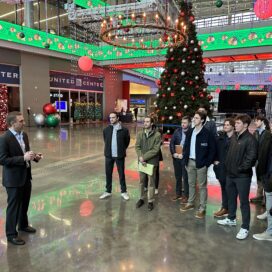Research on the Intersection of People and Machine Learning
Personality Research
Author: Marshall V. King

Ahmed Abbasi – Professor of IT, Analytics and Operations; Co-Director of HAL
Research Focus: Exploring the Intersection of People and Machine Learning
Much of Ahmed Abbasi’s research focuses on where people and machine learning, or artificial intelligence, intersect.
As our lives become increasingly digital, he’s studying “how we can try to improve outcomes in understanding that,” he said.
Abbasi, the Joe and Jane Giovanini Professor of IT, Analytics, and Operations. He serves as director of the Analytics Ph.D. program and is co-director of the Human-centered Analytics Lab. at the Mendoza College of Business. Abbasi and co-director Ken Kelley say their work in HAL “cuts across what would traditionally be part computer science, part statistics, part psychology.”
Exploring Personality Characteristics through Text-Based Measurement

Ken Kelley – Senior Associate Dean; Co-Director of HAL
One of the questions Abbasi is working to answer is whether personality characteristics can be measured from what someone posts online. He’s using machine learning to probe the question.
“When you try to measure and understand people, there’s this 500-year-old technology called surveys,” said Abbasi. The problem is that people, particularly in the modern era, see them as invasive and response rates are low.
Abbasi, along with Kai Yang of Shenzhen University in China and Raymond K. Lau of City University of Hong Kong, published a paper titled, “Getting Personal: A Deep Learning Artifact for Text-Based Measurement of Personality.”
“We live in an era of great socio-economic uncertainty,” they wrote in their introduction. “At the same time, datafication, democratization, consumerization, and the ubiquity of social media have created a seemingly insatiable appetite for real-time analysis, insights, forecasts, and scrutiny of organizational policies, decisions, and performance. Across time zones, industry sectors, and professions, everyone from financial analysts and epidemiologists to policy makers and think tanks are interested in better insight and foresight.”
Breaking Stereotypes and Uncovering the Impact
Abbasi said, “Personality is extremely important for a whole slew of policy-related aspects of our lives.”
The trio worked with anonymized posts from student essays, Reddit, and social media platforms. Using survey methodology as a framework, they utilized machine learning to see if text posts could analyze five dimensions: extroversion, neuroticism, agreeableness, conscientiousness, and openness. Unlike emotions, these are relatively stable and not affected greatly by adverse events, they said.
Demographics are easier to sort digitally. “We tend to stereotype personality through the demographics,” he said. The behavior of soccer moms and folks who live in the suburbs are often touted when talking about survey models, whether they’re analog or digital.
The value of being able to measure personality traits rather than stereotypes has been demonstrated by other researchers showing the connection between personality and rational decision-making among chief executive officers of companies. “What they project, say, and do can have profound implications on the success of a firm,” Abbasi said.
What people and companies project on social media isn’t always their true personality, Abbasi said. However, using AI language models harnessed to theory and intuition can produce powerful results. “Coupling machine learning with human knowledge and expertise is the best method,” he said. “Our models are not just using the bajillion parameters.” Their research debunks the “brute force AI” fallacy that assumes large language models can address most natural language processing methods.
Abbasi created a hybrid of his own programming and GPT to assess the data, as well as other language models that are manually curated. That essentially turns human expertise and knowledge into powerful and usable code.
The trio concluded that their DeepPerson framework “makes personality detection from text possible, practical and valuable.”
Abbasi is at work on other projects, including a software release. “In general, I’m working with this idea of how we can incorporate language theories and knowledge into these advanced and large language models,” he said.
@nditaodept
@nditaodept
YouTube Channel
LinkedIn ITAO Group
Check out these other featured stories:
Topics:




